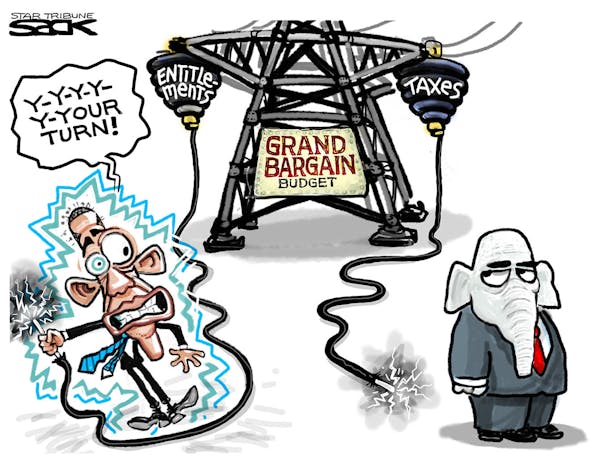The national deficit and debt are unsustainable. Unless there are significant shifts in fiscal policy, there will be a reckoning.
At best, expect an orderly erosion of available options. At worst? A financial crisis that may be more severe, with less ability to respond, than the one that triggered the Great Recession in 2008.
That is unless elected officials — and by definition those voters who send them to Washington — make the hard decisions to get America's fiscal house in order.
While far from perfect, President Obama's proposed 2014 budget is a significant attempt to take control of the situation. Instead of the bipartisan bashing it has received, it should be embraced as a framework for bipartisan compromise.
Criticism of the $3.8 trillion budget comes from predictable corners. Minnesota Republican Reps. John Kline, Michele Bachmann and Erik Paulsen have historically balked at higher taxes. Democratic Reps. Keith Ellison and Rick Nolan, as well as Sen. Al Franken, are pushing back against a president of their own party because he proposes reigning in entitlement programs including Medicare and Social Security.
America is in this self-inflicted fiscal situation because of years of out-of-balance taxing and spending, along with the coming demographic tsunami. It will take a reversal of that equation to get on track to fiscal sanity, let alone sustainability.
Even with the changes proposed in the Obama budget, the 2014 deficit would be $744 billion, or about 4.4 percent of the country's gross domestic product. While an improvement from the near 10 percent seen recently, it's hardly the austerity approach that has failed in England.
Budgets, by definition, are political as well as fiscal documents. But this one has even more specific political overtones. It's designed to get Republicans to re-engage in negotiations over a "grand bargain," in which the president trades politically risky spending adjustments to social programs, while the GOP agrees to take political risks by raising revenue, most likely as a result of long-overdue tax reform.
Some additional revenue has been generated as a result of political compromise that avoided the so-called "fiscal cliff," as well as through the expiration of the payroll tax cut. But more needs to be done.
While the budget includes sobering spending cuts and tax increases, it also would make strategic investments in the country's future. Infrastructure investment would increase by $50 billion, with $40 billion dedicated to a "Fix it First" fund for highways, bridges, transit systems and airports.
Obama also proposes a program to offer preschool to all 4-year-olds from families with low and moderate incomes. That funding would come from increased tobacco taxes.
But the best and most meaningful investment in America would be accomplishing the bipartisan objective of reducing the deficit by $4.3 trillion over 10 years. It would be a fiscal and political miscalculation to wait beyond this budget year. Without spending cuts and higher revenues, the problem will only get worse as the years pass, particularly with baby-boomer-fueled spending spikes looming.
The political calendar is another consideration, with the 2014 midterm elections in sight. Right after the victory and concession speeches, the 2016 presidential campaign will begin — further freezing the political process. The country can't wait until 2017 to tackle this problem.
Because of the politics, Obama's budget may be "dead on arrival," as some have claimed. Nevertheless, it should spark constructive negotiation in Congress — not yet another exercise in rigid ideology and avoidance of responsibilities.
--------------------
An editorial of the Star Tribune (Minneapolis). Follow the editorial board: on Twitter | on Facebook | on Instagram | on Google+
Ukraine aid vote is a domestic and geopolitical inflection point



